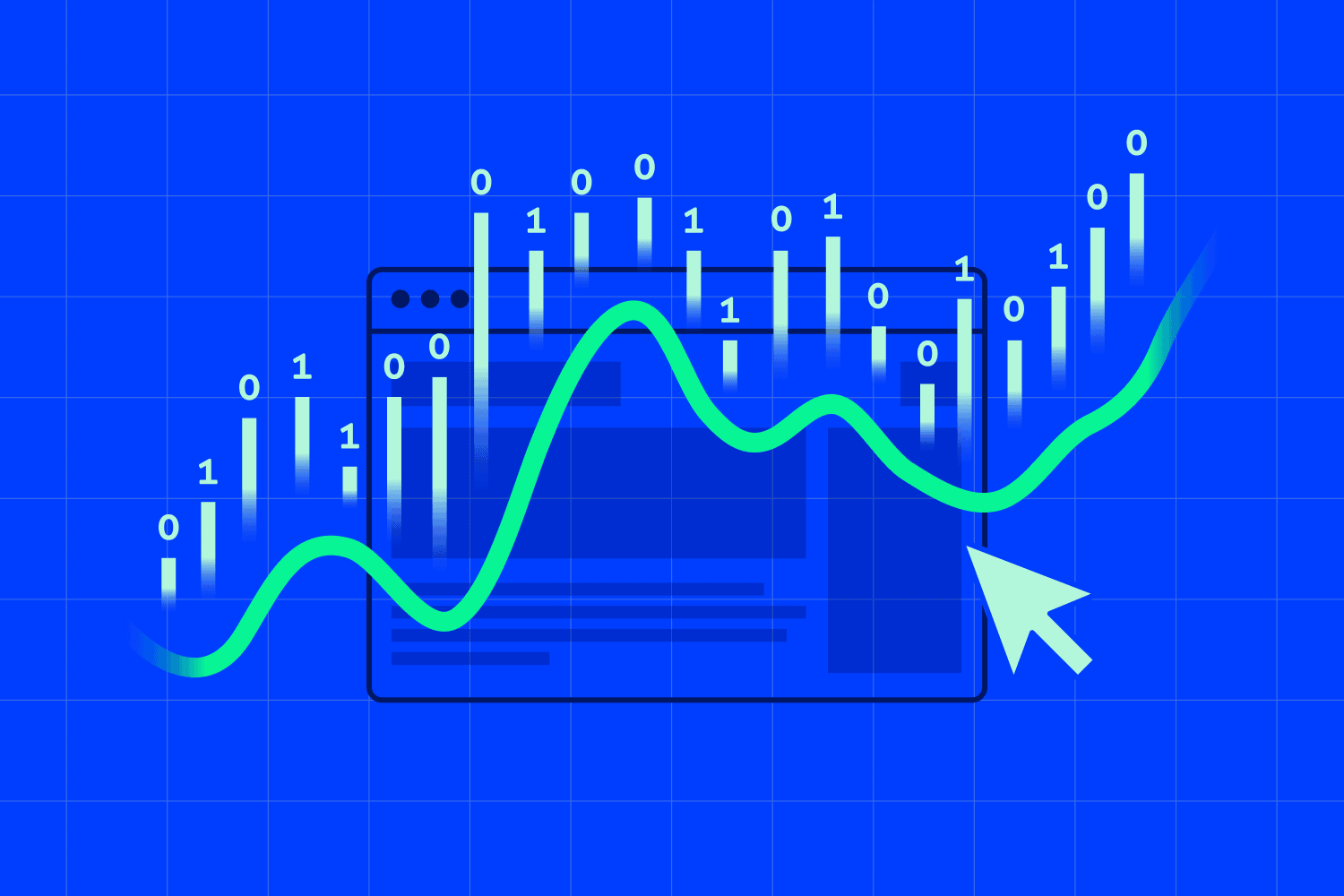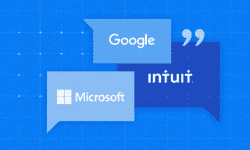Over the past few years, the technology industry has experienced dramatic highs and lows. 2020 and 2021 were marked by increased innovation, accelerated growth, and workforce expansion. On the other hand, 2022 and 2023 brought mass layoffs, falling market capitalizations, and a weakening of global tech spending.
As we navigate 2024, the landscape appears positioned for a triumphant comeback. Inflationary pressures are forecasted to ease and new innovations are capturing the attention of consumers, investors, and executives across various industries. Emerging areas like generative AI (genAI), spatial computing, and quantum computing are growing at a rapid clip and have the potential to completely revolutionize how people live, work, and create.
Meanwhile, sustainability and cybersecurity are high priority for tech powerhouses—as environmental impact and data safeguards are inextricably linked to a company’s growth and longevity.
Below, we dive into the key trends that will shape the technology landscape in upcoming quarters and share the key insights that will keep you ahead of the market.
Tech Industry Trends at a Glance
- Increased Integration of AI and Generative AI
- Growth in Spatial Computing
- Quantum Computing is Generating Investor Buzz
- Developments in Home Health Technology
- Sustainability is a Top Priority
- The Dawn of Humanoid Robots
- Cybersecurity Concerns Loom Large
Greater Integration of AI and GenAI
Over the past year, generative AI (genAI) has rapidly accelerated digital transformation across various industries, bringing new possibilities to everything from investing to market research, customer support, and product development.
2023 was all about learning the use cases of genAI, as companies raced to introduce their own genAI offerings and capabilities into a fiercely competitive market (i.e. OpenAI’s ChatGPT).
Having proven to be a catalyst for business growth, genAI is projected to boast a $1.3 trillion market evaluation by 2032 due to the ever-increasing number of companies integrating this technology.
Why? Executive leadership across industries are recognizing that tedious tasks like scheduling, compliance adherence, and organizing internal data can be managed by AI—leaving more time and resources for workers to devote to complex tasks.
And while genAI is being touted as a miracle solution to business and operational obstacles, concerns surrounding the ethics and regulation of this technology, which have yet to be standardized or made universal, are rising. Ultimately, tech companies must leverage reliable genAI solutions and stay on top of regulatory updates to reap the full benefits.
Another result of the generative AI boom has been the rapid growth and transformation of the semiconductor space. With the new genAI-driven business landscape, it is necessary to expand data centers and semiconductor fabrication plants to meet the rising demand for computing power.
At the same time, semiconductor companies like NVIDIA are catapulting genAI technology forward, making it faster, cheaper, and better. Together, genAI and semiconductors have the potential to completely revolutionize computing power and usher in a new era of technology and innovation.
Note: AlphaSense’s generative AI draws on a content database filled with top-tier business and financial content, including company documents, business news, expert transcripts, and analyst reports. This means our users can be confident that the summarizations come from the most trustworthy and relevant sources.
Spatial Computing is Poised for Growth
A relatively new concept, spatial computing is defined as “human interaction with a machine in which the machine retains and manipulates referents to real objects and spaces,” according to MIT Media Lab researcher Simon Greenwold.
In other words, it’s a form of computing that uses AI and computer vision to blend virtual content with the physical world around us—virtual reality, augmented reality, and mixed reality being just a few examples of technologies that enable spatial computing.
With the recent release of Apple’s Vision Pro, as well as Microsoft’s Hololens2 and Meta’s Quest Pro, spatial computing devices are quickly gaining mainstream popularity. In fact, projections for the global spatial computing market are valued at $269.8 billion by 2030 with a CAGR of 23.1% from 2024-2031—a substantial increase from its 2022 evaluation of $81.8 billion.
According to broker research on the AlphaSense platform, Apple’s release of Vision Pro is a pivotal moment that marks the advent of spatial computing and could transform how people see and interact with technology.
And while these products are still largely seen as novel entertainment for consumer use, they also have a multitude of applications in the workplace and educational sphere.
For example, spatial computing can provide immersive and realistic training scenarios where learners can practice and master various skills and tasks, with zero risk (i.e. medical students can learn and practice surgical procedures, diagnosis, and treatment). In the workplace, it can enable designers and engineers to create and test virtual prototypes of models, saving valuable resources (i.e. car designers and engineers testing virtual models of cars without the need to create a physical model).
This technology is still in its infancy and is a ways away from widespread consumer or company adoption. However, 2024 is expected to bring much more buzz and interest to spatial computing, particularly from investors, consumers, and ambitious companies wanting to enter the competitive landscape early.
Quantum Computing is Generating Investor Buzz
Like spatial computing, quantum computing is a relatively new term gaining traction with investors, venture capitalists, as well as biotech and healthcare startups, demonstrating a broad range of potential use cases—including financial modeling, weather forecasting, genome sequencing, drug discovery, cryptography, cybersecurity, and more.
Funding within the quantum computing space set a new record in 2023 due to early investors (i.e., banks and financial services organizations) wanting to leverage AI systems for fraud detection, risk management, and high-frequency trading.
The topic of quantum computing has increasingly appeared in earnings transcripts found within the AlphaSense platform, with one aerospace company seeing it as a highly relevant technology for global security:
“I do think that quantum computing will be highly relevant, in particular when it comes to global security…if someone had a highly capable quantum computer today, they could unlock not just the security protocols or, let’s say, everything is happening on the Internet today, but they could also go back in history and unlock everything that has happened in the past.”
– Bridger Aerospace Group Holdings | Special Call 2024
Another company highlights quantum computing’s potential in machine learning and ability to work with sparse data, which classical computing could struggle with:
“One of the particular strengths of quantum computing is machine learning…As proof points, we have shown that quantum and ML models are more expressive and capture the signal better in the underlying data. We have shown that we can create equivalent or better quantum models than classical models using less data. We have shown an ability to dramatically reduce the number of iterations required to train those models using quantum. And we are now showing that quantum computers can work with sparse data where classical computing may have limits or just wouldn’t work.”
– IonQ, Inc. | Q4 2023 Earnings Call
But according to expert calls found in the AlphaSense platform, there are no clear leaders yet in the quantum computing space, and education is necessary for people to understand the full scope of this technology’s utility and benefits, Another expert transcript points to scale and speed as the biggest challenges on the road to commercializing quantum computers.
In any case, this technology is one to watch—the global computing market is set to grow at a CAGR of 28.8% between 2024 – 2032 and reach a value of around $8.2 billion by 2032.
Developments in Home Health Technology
Medical technology, or medtech, and medical devices have seen consistent and accelerated growth in recent years as a result of the COVID-19 pandemic. Consequently, home health tech, or wearable devices that enable remote patient monitoring and telemedicine, has emerged as a sub-sector in the tech space.
A leader of the market, Withings, created an at-home multifunction device that allows individuals to take their temperature, check blood oxygen levels, and measure and store results from a digital stethoscope. Other companies like Sennheiser are developing sophisticated sensors within wireless earbuds that allegedly track a person’s heart health with clinical accuracy—in addition to functioning as normal earbuds.
According to a Mcknight’s Senior Living Article Found within the AlphaSense platform, this kind of technology holds tremendous promise, particularly for senior patients who need consistent monitoring and care. Smart home health technology “makes caregiving simpler, more efficient, holistic, or of higher quality.”
Tech giant Salesforce announced its entry into home health tech last year by adding a Home Health integration to their health Cloud software solution, according to broker research in AlphaSense. It provides a centralized platform to manage patient records and facilitate better communication among healthcare teams and patients, ultimately improving overall patient care. Other tech companies are likely to follow suit in extending their reach into home health tech, particularly if they already have a presence in the health space, in order to remain competitive.
In 2024, this sub-sector will continue to expand as technology develops and people become more accustomed to the idea of home healthcare. With clinician burnout on the rise due to a national physician shortage, this kind of technology will be critical to ensuring that patients get the healthcare support they require.
Sustainability is a Top Priority for Tech
With deadlines for net-zero emissions commitments soon approaching, sustainability is top of mind for C-suite leaders. Likewise, more consumers are choosing to invest in and buy from companies that allow them to minimize the negative impact their choices have on the environment.
Electric vehicles and other modes of green transportation are expected to gain even more market share in 2024 while novel technologies like carbon capture and storage, as well as renewable energy technologies, will become more prominent and widespread. Additionally, IT companies will increasingly be shifting to data centers that run on low-carbon energy.
“Organizations that have not already made the switch to high-density cloud computing will need to do so to meet KPIs and sustainability goals,” says Leah Goldfarb, environmental impact officer at Platform.sh. “We will likely see more companies choosing sustainable data management this year, both to reduce environmental impact and to cut operational costs.”
One recent example is Amazon’s deployment of nearly 50 new electric trucks across Southern California for transporting customer packages. This, combined with their over 10,000 Rivian-made electric delivery vans, has made Amazon an operator of one of the largest fleets of electric delivery vans in the country. This is all part of Amazon’s commitment to be carbon-neutral by 2040.
The Dawn of Humanoid Robots
The age of humanoid robots is here: companies including Tesla, Boston Dynamics, Agility Robotics, and Figure are making waves for developing humanoid robots with impressive capabilities and diverse applications in industrial factory work, healthcare, education, and more.
Already, Amazon and BMW are testing robot “workers” in their industrial workflow. And while the Occupational Safety and Health Administration is still in the process of developing safety rules for working with robots like these, there is no question that this market is rapidly expanding and becoming more competitive.
As robotic developers integrate genAI and large language models into programming to allow for natural language task comprehension, the capabilities these machines possess are only expanding—with some humanoid robots even saving lives. In 2024, we expect to see more news regarding developments in the humanoid robot space, as well as more companies integrating this technology into their operations.
Cybersecurity Concerns Loom Large
With an ever-increasing volume of newly published data, recent geopolitical tensions exacerbating the risk of security violations, and regulatory scrutiny intensifying, data protection is a critical priority for tech companies, customers, and stakeholders—now more than ever before.
In 2024, tech leaders are prioritizing cybersecurity and more so, cyber resilience. This means having systems in place that enable seamless data protection even in the event that security is breached. AI can be integral in automating cyber defense, as well as speeding up breach detection and containment.
In 2024, analysts expect to see double-digit growth from 2023 in global spending on security and risk management, due to the persistent threat landscape, ongoing cloud adoption, remote work, the emergence of genAI, and evolving regulations.
Broker research within the AlphaSense platform also states that the cybersecurity market is expected to grow at a CAGR of 10.5% until 2028, as digital transformation makes cybersecurity a priority.
Earnings transcripts within the platform point to the same conclusion:
- CrowdStrike Holdings is highlighting cybersecurity as a key priority in discussions with boards, especially in light of the recent SEC breach disclosure regulation increasing pressure on companies and their boards.
- SentinelOne underscores the importance of companies having modern AI-based and enterprise-wide cybersecurity, stating that in today’s digital and connected world, disjointed platforms and legacy vendors drain resources and only provide a false sense of protection.
- BlackBerry has announced the opening of its new Cybersecurity Center of Excellence in Kuala Lumpur, which is intended to train a skilled cybersecurity workforce in Malaysia.
Impacts on Adjacent Industries
Certain technological advancements can move an entire industry forward, creating new possibilities where they did not exist before.
The following are some of the main industries that are closely tied to technology, as well as how they are being affected by the trends discussed above:
Healthcare
Technology has had such a major impact on the healthcare industry that two sub-sectors exist, specifically representing the overlap of these two industries. The sub-sectors are medtech and medical devices, and both have experienced staggering growth and development in the past few years.
Some examples of technologies that have revolutionized the healthcare space are telemedicine, electronic health records, wearable devices, and generative AI. The latter has applications that include greater personalization of care and better clinical decision-making, as well as improved drug discovery and development in biopharma.
Related Reading:
Consumer and Retail
Technology has profoundly transformed the consumer and retail industry, from the advent of e-commerce and social media marketing to personalization in-store and utilization of consumer data for optimal product development.
Like in healthcare, genAI has also proven itself to be a transformative force in the consumer and retail space, with use cases that include smart product recommendations, supply chain optimization, and personalized shopping experiences for consumers.
Spatial computing is making waves in the retail space, as augmented reality can be used to create interactive shopping experiences and product visualizations that lead to greater likelihood of purchase and lesser likelihood of returns.
Manufacturing
The manufacturing industry has historically been one of the slowest and most resistant to change, largely due to the significant cost and time sacrifices associated with any facility or equipment reconfiguration.
However, in recent years, the cracks in the foundation have begun to show. In a highly modern and digital world, avoiding technological transformation puts manufacturing companies at a disadvantage, leaving leadership more vulnerable to issues like supply chain disruptions, labor shortages, and emerging modern competitors.
Now, many manufacturing companies are embracing technology and are reaping the benefits. Humanoid robot workers have been entering the manufacturing workforce and training alongside human workers—which could be a way to increase resilience amidst labor shortages.
Smart factories, which integrate technologies like 5G, Internet of Things (IoT), and cloud computing, are bringing productivity gains, cost reductions, and improvements in safety and sustainability. Artificial intelligence is being used to unlock unprecedented workflows like remote monitoring, servicing, and equipment operation—increasing efficiency while saving countless resources. Generative AI is also transforming the space with use cases like predictive maintenance, data-driven decision making, and increasing innovation, as well as improved ability to predict and manage supply chain disruptions.
Technology Industry Outlook
In 2024, the technology landscape is well-positioned for continued growth and advancement, though residual headwinds may slow this growth. Plenty of new technologies are generating interest and excitement because of the potential possibilities they could bring to various industries and people’s lives. At the same time, global and economic uncertainties persist, and many of these new technologies are still awaiting new regulations and policies that will dictate how we use them.
Technologies like generative AI, quantum computing, spatial computing, and humanoid robots are revolutionizing the way we interact with tech and how business is conducted. With these advancements, cybersecurity is becoming a greater concern and companies will continue investing in data protection and risk management solutions.
Now is the time for tech leaders to be proactive and stay on top of emerging trends, regulations, and market movements. Companies that are unafraid to innovate and experiment with new technologies—while staying keenly aware of competitors’ moves, consumers’ interests, and relevant policies—will lead in this age of technological adoption and evolution.
Stay on Top of the Evolving Tech Landscape with AlphaSense
The technology industry is evolving at an accelerated pace, and it’s critical to stay on top of every new development, trend, and key player that could affect the market. But in today’s age of information overload, finding the right insights and cutting through the noise is a nearly impossible task.
That’s why you need a tool that does all the heavy lifting for you, so you can focus on leveraging and analyzing information rather than searching for it.
AlphaSense is a leading provider of market intelligence, including 10,000+ high-quality content sources from more than 1,500 leading research providers—all in a single platform. Analysts, investors, researchers, and decision-makers across industries can access exclusive research reports only found elsewhere in disparate locations and often behind expensive paywalls. Specific types of content you’ll find on the AlphaSense platform include:
- Company documents including event transcripts, global filings, press releases, company presentations, product brochures, and ESG reports
- Industry research from the world’s top financial research firms, including Citi, Bank of America, Jefferies, and William Blair
- Expert call transcript library that gives access to 40,000+ insightful interviews with industry experts including customers, competitors, product leads, engineers and partners
- Thousands of curated news sources, trade publications, and regulatory information
- Thought leadership from tech consultancies and patents
The AlphaSense platform also delivers unmatched AI search capabilities and features for analyzing qualitative and quantitative research, and can mine unstructured data for the most critical insights, including:
- Automated and customizable alerts for tracking regulatory filings, companies, industries, and potential investments
- Table export tools that support M&A workflows like target lists and due diligence
- Smart Synonyms™ technology that ensures you never miss a source important to your research
- Smart Summaries, our first generative AI feature, transforms and improves the search experience on our platform, generating key insights from earnings calls, expert calls, and broker research for faster analysis
Stay ahead of the rapidly evolving technology landscape and get your competitive edge with AlphaSense.




